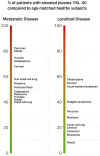YKL-40-A Protein in the Field of Translational Medicine: A Role as a Biomarker in Cancer Patients?
- PMID: 24281168
- PMCID: PMC3837317
- DOI: 10.3390/cancers2031453
YKL-40-A Protein in the Field of Translational Medicine: A Role as a Biomarker in Cancer Patients?
Abstract
YKL-40 is a 40 kDa glycoprotein produced by cancer cells, inflammatory cells and stem cells. It probably has a role in cell proliferation and differentiation, inflammation, protection against apoptosis, stimulation of angiogenesis, and regulation of extracellular tissue remodelling. Plasma levels of YKL-40 are often elevated in patients with localized or advanced cancer compared to age-matched healthy subjects. Several studies have demonstrated that high plasma YKL-40 is an independent prognostic biomarker of short survival in patients with different types of cancer. However, there is not yet sufficient data to support determination of plasma YKL-40 outside research projects as a biomarker for screening of gastrointestinal cancer and determination of treatment response and poor prognosis before or during treatment and follow-up. Plasma YKL-40 is also elevated in patients with other diseases than cancer, e.g., severe infections, cardiovascular disease, diabetes, chronic obstructive lung disease, asthma, liver fibrosis and rheumatoid arthritis. Co-morbidity should therefore always be considered in patients with cancer, since other sources than cancer cells can increase plasma YKL-40 levels. Future focused translational research projects combining basic and clinical research are needed in a joint effort to answer questions of the complex function and regulation of YKL-40 and the question if plasma YKL-40 is a clinical useful biomarker in patients with cancer.
Figures




Similar articles
-
Plasma YKL-40: a potential new cancer biomarker?Future Oncol. 2009 Sep;5(7):1065-82. doi: 10.2217/fon.09.66. Future Oncol. 2009. PMID: 19792974 Review.
-
Serum YKL-40, a new prognostic biomarker in cancer patients?Cancer Epidemiol Biomarkers Prev. 2006 Feb;15(2):194-202. doi: 10.1158/1055-9965.EPI-05-0011. Cancer Epidemiol Biomarkers Prev. 2006. PMID: 16492905 Review.
-
Role of inflammatory marker YKL-40 in the diagnosis, prognosis and cause of cardiovascular and liver diseases.Crit Rev Clin Lab Sci. 2016 Dec;53(6):396-408. doi: 10.1080/10408363.2016.1190683. Epub 2016 Jun 8. Crit Rev Clin Lab Sci. 2016. PMID: 27187575 Review.
-
Plasma levels of YKL-40 as a prognostic factor in childhood acute lymphoblastic leukemia.Mol Clin Oncol. 2021 Aug;15(2):168. doi: 10.3892/mco.2021.2330. Epub 2021 Jun 18. Mol Clin Oncol. 2021. PMID: 34194746 Free PMC article.
-
YKL-40/chitinase-3-like protein 1 is associated with poor prognosis and promotes cell growth and migration of cholangiocarcinoma.Tumour Biol. 2016 Jul;37(7):9451-63. doi: 10.1007/s13277-016-4838-z. Epub 2016 Jan 19. Tumour Biol. 2016. PMID: 26781979
Cited by
-
YKL-40 in the brain and cerebrospinal fluid of neurodegenerative dementias.Mol Neurodegener. 2017 Nov 10;12(1):83. doi: 10.1186/s13024-017-0226-4. Mol Neurodegener. 2017. PMID: 29126445 Free PMC article.
-
Assessment of YKL-40, lipid profile, antioxidant status, and some trace elements in benign and malignant breast proliferation.Mol Biol Rep. 2020 Sep;47(9):6973-6982. doi: 10.1007/s11033-020-05756-1. Epub 2020 Sep 2. Mol Biol Rep. 2020. PMID: 32876843
-
Diagnostic and Prognostic Impact of Circulating YKL-40, IL-6, and CA 19.9 in Patients with Pancreatic Cancer.PLoS One. 2013 Jun 26;8(6):e67059. doi: 10.1371/journal.pone.0067059. Print 2013. PLoS One. 2013. PMID: 23840582 Free PMC article.
-
Conserved YKL-40 changes in mice and humans after postoperative delirium.Brain Behav Immun Health. 2022 Nov 17;26:100555. doi: 10.1016/j.bbih.2022.100555. eCollection 2022 Dec. Brain Behav Immun Health. 2022. PMID: 36457825 Free PMC article.
-
Recent advances in label-free optical, electrochemical, and electronic biosensors for glioma biomarkers.Biomicrofluidics. 2023 Feb 22;17(1):011502. doi: 10.1063/5.0135525. eCollection 2023 Jan. Biomicrofluidics. 2023. PMID: 36844882 Free PMC article. Review.
References
-
- Rehli M., Niller H.H., Ammon C., Langmann S., Schwarzfischer L., Andreesen R., Krause S.W. Transcriptional regulation of CHI3L1, a marker gene for late stages of macrophage differentiation. J. Biol. Chem. 2003;278:44058–44067. - PubMed
LinkOut - more resources
Full Text Sources

